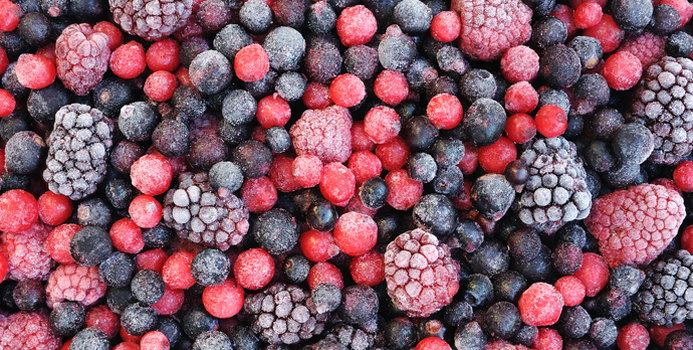Buying certain ingredients in bulk will save you loads of money while also ensuring you have a pantry, fridge, and freezer stocked full of healthy ingredients at the ready. Keeping nutritious staples on hand will allow you to throw together delicious, affordable, nutrient-dense meals and snacks to help you stick to your healthy eating goals.
Oats
Oats are one of the world’s most nutritious foods. They are chock-full of both soluble and insoluble fiber, including belly-benefitting beta-glucans. Buy large tubs of oats rather than those individually-portioned out bags of oatmeal to save boatloads of hard-earned cash, as well as sugar and sodium the pre-portioned bags have added to them. Think beyond that comforting bowl of hot oatmeal though — oats can be used in place of breadcrumbs in crab cakes or salmon patties, as a chewy component of pancakes or muffins, or to bulk up your smoothies. In addition to providing fiber, research has shown that oats can increase production of appetite-suppressing hormones.
Popcorn Kernels
Popcorn is a whole grain, meaning it contains all three parts of the grain (the bran, germ, and endosperm) unlike refined grains, which have been stripped of vitamins, minerals, fiber, and antioxidants. Popcorn kernels last pretty much forever when stored properly — away from heat and moisture in a tightly-sealed container.
Canned Tomato Products
Tomatoes are essential components to so many incredibly delicious and healthy dishes. And did you know that canned tomato products are actually higher in the antioxidant lycopene than their fresh counterparts? Stock up on larger containers of tomato paste, tomato sauce, and canned diced, stewed, or whole tomatoes. Seek out “no salt added” varieties and store whatever you don’t use in any container (other than the original can) in your fridge or freezer.
Vinegar
Acid is one major flavor component that just about every dish needs for balance. Acid from vinegar brightens a dish if you notice it tastes flat but you already added enough salt and spices. There is a myriad of different vinegar options, and each contains its own characteristic taste. Looking for a sweet and sour flavor? Go for balsamic vinegar. Need to impart fruit, crisp flavor? White wine vinegar is your best bet. The oaky, aged notes of red wine vinegar pair well with red meats and root vegetables.
Nuts in the Shell
The unit price for large bags of nuts is significantly lower than the unit price for smaller bags of the same exact product. While they are fine left out at room temperature, they will last even longer if you store them in your fridge or freezer, and nuts in their shells last longer than shelled ones. Simply shell them and then roast and season them as you need them.
Whole Spices
Spices can catapult the flavor of any dish without any significant sodium, fat, sugar or calories. Since fat and sugar provide a lot of flavor, but also provide a lot of fattening calories, spices are a healthy alternative way to flavor your food.
While already-ground spices last about six months to a year, whole spices last even longer and you’ll get more bang for your buck buying these in bulk. You can purchase a spice grinder (coffee grinders work well, too) and then grind the spices as you need them. Store your whole spices in an airtight container in a dry, cool area.
Dry Beans & Lentils
In general, beans and lentils are a nutrition powerhouse, but the canned varieties usually have a lot of added sodium. Stock up on a variety of dried beans and lentils for a cheap, protein-packed, fiber-filled ingredient for soups, casseroles, chilis, or tacos. Unlike meat, beans and lentils contain no saturated fat or cholesterol, are lower in calories, are much more affordable, and provide fiber and a hefty dose of the antioxidants called anthocyanins, as well as vitamins and minerals. Beans and lentils last for years when kept sealed in an airtight container (transfer from the bag they came in) in a dry, cool place.
Quinoa
Quinoa, which is technically not a grain but is eaten like one, is actually a pseudo-cereal. Quinoa is also a complete protein — meaning it contains all the essential amino acids your body needs to build protein. Quinoa is also gluten-free, meaning it is safe for those with celiac disease. One cup of cooked quinoa provides more than eight grams of protein — much more than other grains.
Frozen Berries
In most parts of the country, fresh berries are not available all year long. Frozen bags of fruit, especially berries, are much cheaper than smaller bags and they stay good for a long period of time. These nutrient-dense morsels work well in smoothies, pancakes, muffins, breads, and parfaits.
Reduced-Fat/Light Cheese
Because cheese can be expensive, I suggest buying it in bulk, especially if it happens to be on sale, because you can freeze it. Yes, you read that correctly — you can freeze cheese! Larger blocks of cheese are cheaper per ounce, and you can shred it and divide it up into smaller bags to use some now and put some away in the freezer for use later.
[Image via Shutterstock]



